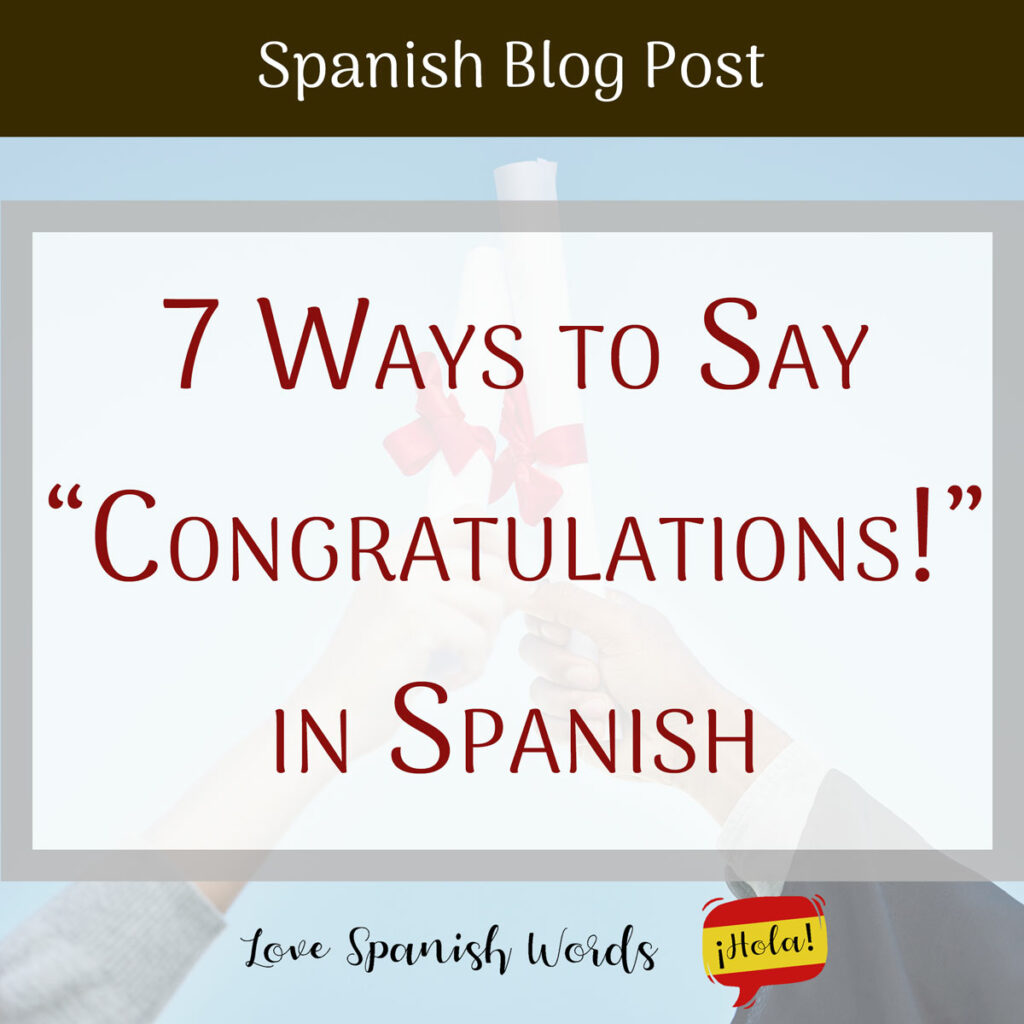Congratulating someone is a thoughtful way to make any occasion more special, and doing so in their native language adds a personal touch. Whether you want to celebrate a birthday, graduation, promotion, or a great audition or sports match, there are numerous ways to express this sentiment in Spanish.
Each congratulatory expression below is tailored to different occasions. Using them shows your thoughtfulness and helps celebrate someone’s success while sharing in their happiness. Let’s explore some of the most common and authentic ways to say “congratulations” in Spanish.

¡Felicidades!
¡Felicidades! is the most common way to say “congratulations” in Spanish. This versatile expression can be used in both formal and informal contexts and is appropriate for a variety of celebratory occasions such as birthdays, holidays, winning sports games, career achievements, academic successes, and other special events. If you want to emphasize your congratulations, you can use ¡Muchas felicidades! (many congratulations) or ¡Muchísimas felicidades! (very many congratulations).
¡Felicidades! can be said as a single-word expression, but sometimes you may want to be specific about what you’re congratulating someone for. In this case, you follow a structure using ¡Felicidades por + noun/infinitive. Below are some examples:
- ¡Felicidades por el nacimiento de sus bebé! (Congratulations on the birth of your baby!)
- ¡Felicidades por el acenso en su trabajo! (Congratulations on your promotion at work!)

¡Bien hecho!
¡Bien hecho! means “well done” in English. This is a positive way to praise someone’s accomplishment, acknowledging a job well done and recognizing the effort and skill involved. A slight variation of this phrase is ¡Qué bien hecho!, which translates to “how well done” in English.
- ¡Bien hecho en tu actuación! Fue muy entretenida. (Well done on your performance! It was very entertaining.)
- ¡Bien hecho! ¡Ahora comienza una nueva vida! (Well done! Now a new life begins!)
¡Buen trabajo!
¡Buen trabajo! translates to “good job” or “well done.” This congratulatory phrase is similar to ¡Bien hecho! and can be used in both formal and informal situations. Use this phrase when someone has excelled in something, such as playing a soccer game, performing a dance routine, or getting a good grade on an exam. Other variations include ¡Excelente trabajo! (great work) and ¡Qué buen trabajo hiciste! (You did an amazing job!).
- ¡Buen trabajo en terminar el proyecto a tiempo! (Good job on finishing the project on time!)
- ¡Buen trabajo en la presentación! Explicaste todo perfectamente. (Good job on the presentation! You explained everything perfectly.)
¡Sigue así, buen trabajo!
Continue like that, good job!

¡Bravo!
¡Bravo! is similar to the English word “bravo.” This expression is used to applaud a person’s success or performance. It is often used to cheer someone on, particularly in competitive contexts such as sports matches or artistic performances. It’s also commonly heard after a presentation, performance, or public speaking. Often, bravo is accompanied by clapping in a lively group, and it’s common to hear it yelled out so the person being congratulated can hear the enthusiastic support.
- ¡Bravo! Ese fue un partido increíble. (Bravo! That was an incredible match.)
- ¡Bravo a todo el equipo por su victoria! ((Bravo to the whole team for their victory!)
- ¡Bravo! Estás haciendo un gran esfuerzo. ((Bravo! You’re making a great effort.)
¡Felicitaciones!
¡Felicitaciones! is a more formal term than ¡Felicidades! and is often used when congratulating someone for a professional or personal achievement. It is commonly seen in written congratulations or announcements, similar to “congratulations” in English. Examples of occasions where you might use ¡Felicitaciones! include the birth of a child, a wedding, a new house purchase, a work promotion, or the closing of a business deal.
- ¡Felicitaciones por tu cumpleaños! Espero que tengas un día maravilloso. (Congratulations on your birthday! I hope you have a wonderful day.)
- ¡Felicitaciones por el nuevo bebé en la familia! (Congratulations on the new baby in the family!)
¡Felicitaciones por su boda! Merecen ser felices.
Congratulations on your wedding. You deserve to be happy.

¡Enhorabuena!
¡Enhorabuena! is used to express congratulations in a formal or more serious context. It is particularly fitting when congratulating someone on a significant personal or professional achievement such as having a baby, getting engaged, receiving an award or promotion, or reaching important milestones. It’s not typically used for congratulating someone on holidays or birthdays.
If we break down the word enhorabuena, it is made up of three words: en hora buena, which translates to “in good timing.” Therefore, it’s often used to acknowledge someone’s success at reaching an important milestone.
- Enhorabuena por tu graduación. Estoy muy orgullosa de ti. (Congratulations on your graduation. I’m very proud of you.)
- Enhorabuena por el nacimiento de tu hijo. ¡Qué alegría! (Congratulations on the birth of your son. What joy!)
¡Así se hace!
To commend someone for their effort and outcome, you can say ¡Así se hace! This phrase translates to “that’s how it’s done” or “way to go.” While it can be used in both formal and informal contexts, it is more commonly used in informal situations. You might use this phrase to congratulate a sports team or an individual player who performed well. Additionally, it can be used to praise someone who did well on an exam or in a performance.
- ¡Así se hace, equipo! Con determinación y esfuerzo. (That’s how it’s done, team! With determination and effort.
- ¡Así se hace! Has terminado la universidad. (Way to go! You’ve completed university.)

